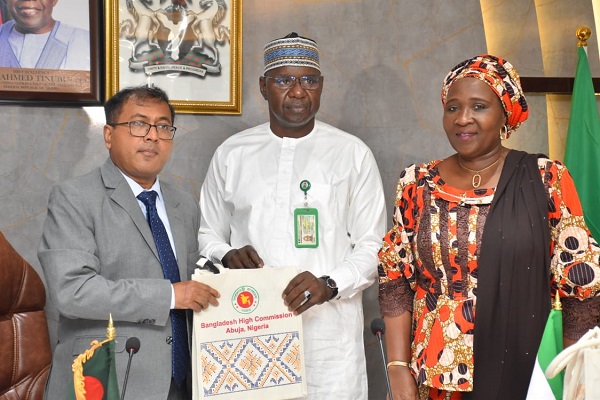
The Federal Ministry of Agriculture and Rural Development (FMARD) has expressed its unwavering desire to collaborate with the government of Bangladesh in agro-farming and to strengthen bilateral relations between both countries and enhance self-sufficiency in food production, job creation and other areas.
The permanent secretary of FMARD, Dr. Ernest Umakhihe conveyed the ministry’s commitment to this partnership during the symposium themed “Promoting Agric-Farming for Trade and Investments to Promote Sustainable and Inclusive Development; Opportunities for Nigeria and Bangladesh”. The event took place in Abuja.
Umakhihe emphasised the significant role of the agricultural sector in the economic performance of both Nigeria and Bangladesh. Collaborating in agro-farming would not only promote the agricultural market for agro-products but also establish linkages with the global agro-supply chain.
He further highlighted the potential of the agricultural sector in Nigeria’s economic development, alongside crude oil. Nigeria heavily relies on agricultural product exports to generate a substantial portion of its national revenue. With relatively abundant arable land for crop cultivation and a large domestic market, local production and processing could be supported and sustained.
However, the permanent secretary acknowledged the challenges faced by the agricultural sector due to the global food crisis, climate change, insecurity, the COVID-19 pandemic and the Russia-Ukraine conflict, which have adversely affected agricultural production in Nigeria and Africa. To overcome these challenges and foster growth in the agricultural sector, more investments are needed.
The Bangladeshi High Commissioner to Nigeria, His Excellency Masudur Rahman, emphasised Bangladesh’s focus on agriculture as a predominantly agricultural country. The government of Bangladesh has been proactive in accelerating economic growth, particularly in the agriculture sector. Efforts have been made to achieve self-sufficiency in food production and security. Aligning with their plans, such as the National Agricultural Policy 2018, National Food Policy and Sustainable Development Goals programme, Bangladesh is determined to develop the overall agricultural sector to improve the economy.
The national president of the Nigerian Association of Chambers of Commerce, Industry, Mines, and Agriculture (NACCIMA), Dele Oye, represented by Alhaji Farouk Suleiman, expressed the objective of creating an avenue for exchanging ideas and establishing trade partnerships that would drive mutual prosperity and sustainable development.
Oye pointed out the enormous opportunities for promoting agro-farming and sustainability between Nigeria and Bangladesh. Both countries possess an abundance of raw materials that can support the development of agribusiness. However, he also highlighted the need to address challenges in infrastructure, financing, and regulation to fully harness the potential of agro-farming and business in both nations.
The collaboration between Nigeria and Bangladesh in agro-farming has the potential to transform the agricultural sector, boost food production, and create job opportunities, contributing to economic growth and sustainable development in both countries. By addressing challenges and capitalising on opportunities, this partnership can pave the way for a prosperous and thriving regional agricultural industry.


